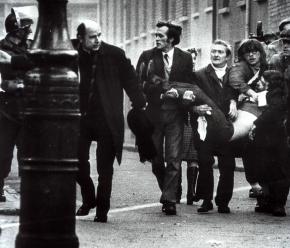Letting the guilty off the hook
Irish socialist , who helped organize the demonstration that was attacked by British troops on Bloody Sunday in 1972, looks at the report issued by the British government that finds fault only with low-level soldiers.
IS THAT it, then? After 38 years, a 12-year inquiry and a 5,000-page report, is that it? A bunch of squaddies and a battalion commander are unmasked as the culprits. No one else involved.
This version, that a dozen no-marks did it all, made it easy enough for David Cameron to denounce the guilty men in ringing terms and apologize unequivocally to the relatives of their victims.
It is they, of course, the Bloody Sunday families, who matter most. Their elation at the report's findings was unbounded. The frenzy of hugs inside the Guildhall and joy in the square outside was bliss to behold and be part of, a dizzying high that still shimmers in the soul.
At the heart of the epic Bloody Sunday campaign had been the implacable determination of the families that the wrong of the Widgery report should be put right and their loved ones vindicated as innocent people unjustifiably done to death.
Saville struck Widgery down and delivered for the families in full measure. But he delivered in large measure, too, for the British army and political establishment. And didn't make life difficult, either, for any key political interest in Ireland. All could embrace in the warm glow of the families' jubilation.

But what if Saville had laid a chunk of the blame on the shoulders of, for example, the commander of land forces in the north, Major Gen. Robert Ford? Or castigated the behavior of Capt. Michael Jackson, second in command of 1 Para on the day? In that circumstance, would Cameron have been able to disown all involved and say that what had happened had brought disgrace?
THE DECISION to send the paras to Derry was taken by Ford six days before the killings. It was foreseeable that their deployment would lead, at the least, to unacceptable violence against the anti-internment marchers, with potentially disastrous consequences for politics in Derry and beyond.
We know it was foreseeable because it was foreseen--most significantly, by senior officers garrisoned in Derry. One felt so strongly that he phoned a friend from military college, David Ramsbotham, then military assistant to Britain's number one soldier, the chief of the general staff, Sir Michael Carver, to ask him to use what offices he had to convey his concerns.
But Ford pressed on with the plan, and traveled to Derry on the day--although he had no operational role, no military reason for being there--to be on the spot, shouting encouragement to the paras as they went in. Saville attaches no responsibility to him for what ensued, even to the extent of suggesting an error in judgment.
Jackson gave evidence to the Inquiry twice, in April and then in October 2003. He was recalled because, in the interim, a document in his handwriting had come to light, purporting to list and map-reference the exact firing positions and targets of every shot.
In Jackson's list, all the targets were identified as gunmen, nail-bombers and petrol-bombers.
Jackson testified that the reason he hadn't mentioned the shot-list in April was that he had forgotten all about it and had only retrieved a "vague memory" since learning of its discovery.
The shot-list had been used by an army spokesman the morning after Bloody Sunday as the authoritative account of events and had formed the basis of the explanation given to the Commons by Lord Balniel the following day.
Saville finds that none of the shots described in the list conformed to any of the shots actually fired. Some of them went through walls. It also emerged that Jackson had written out in his own hand the personal accounts of their experiences on the day of Wilford, the commanders of the three para companies present and the battalion intelligence officer. Jackson's efforts to explain the purpose of this strange exercise was hampered by poor memory.
On more than 20 occasions during his evidence, he used phrases along the lines of, "I cannot remember," "I do not recall," "I have only a very vague memory." Saville rejected suggestions from the families' lawyers that "the list played some part in a cover-up to conceal the emerging truth that some innocent civilians had been shot and killed by soldiers of 1 Para."
This wasn't the only conclusion which might reasonably have been drawn. Jackson was a mere captain on Bloody Sunday. But he rose rapidly thereafter, was NATO commander in the Balkans and, in 2003, the year of his evidence to Saville, reached the pinnacle of the army hierarchy when appointed chief of the general staff.
Had Saville drawn conclusions which reflected harshly on Jackson, Cameron might have found it difficult to damn all involved in Bloody Sunday as scoundrels that no decent army would welcome in its ranks. The families have won what they wanted, and that's the most of it.
But by insulating from blame everyone other than a bunch of disposable miscreants at the bottom, Saville ensured, too, that there are others who will have greeted his report if not with ecstatic delight, then at least with deep sighs of relief.
First published at the Belfast Telegraph.


